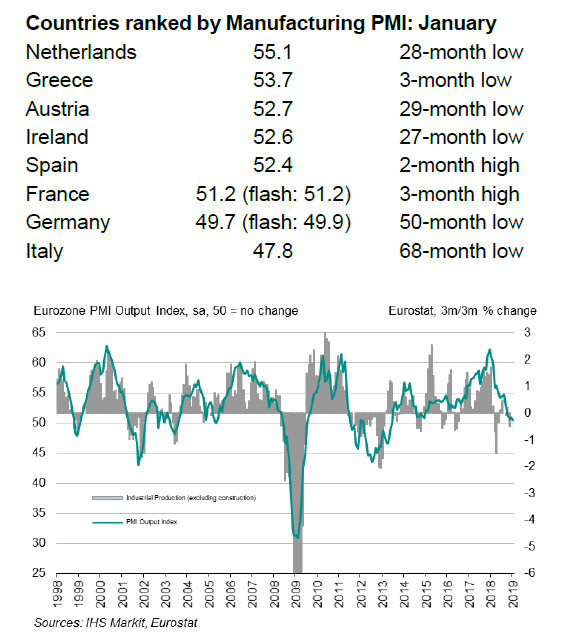Eurozone PMI manufacturing was finalized at 50.5 in January, unrevised, down from December’s 51.4. It’s the six consecutive months of decline and the lowest level since November 2014. Markit noted that “output up marginally, but sharpest fall in new work recorded since April 2013”. Also, “growth sustained via reduction in backlogs and fastest accumulation of stocks in survey history”.
Among the countries, Italy PMI manufacturing hit 47.8, a 68-month low. Germany reading was also in contraction at 49.7, a 50-month low. Franc reading recovered mildly to 3-month high of 51.2. But Ireland reading hit 27-month low, Austria reading hit 29-month low and the Netherlands reading hit 28-month low.
Commenting on the final Manufacturing PMI data, Chris Williamson, Chief Business Economist at IHS Markit said:
“The January PMI adds to the likelihood that the manufacturing sector is in recession and will act as a drag on the economy in the first quarter.
“Some temporary factors remain evident, including an auto sector that is struggling to regain momentum after new emissions regulation and some signs of ‘yellow vest’ disturbances dampening demand in France. However, there appears to be a more deep-rooted malaise setting in, which reflects widespread concerns about the destabilising effect of political uncertainty and the damage to exports from rising trade protectionism.
“Worryingly, weaker than anticipated sales mean warehouses are filling up with unsold stock at a rate not previously recorded over the two decades of prior survey history, suggesting firms will need to cut operating capacity in coming months unless demand revives, boding ill for future production growth.
“While there is some evidence that firms are hoarding labour in the hope of sales picking up again, and business optimism did perk up from December’s six-year low, jobs growth is starting to deteriorate as increasing numbers of firms seek to cut costs and raise productivity. Any such downturn in the labour market will in turn potentially drive consumer sentiment lower, and adds further to the risk that economic growth will continue to slow in coming months.”

